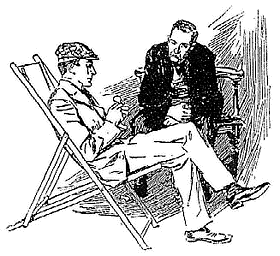“It is simplicity itself,” he remarked, chuckling at my surprise – “so absurdly simple that an explanation is superfluous; and yet it may serve to define the limits of observation and of deduction. Observation tells me that you have a little reddish mould adhering to your instep. Just opposite the Wigmore Street Office they have taken up the pavement and thrown up some earth, which lies in such a way that it is difficult to avoid treading in it in entering. The earth is of this peculiar reddish tint which is found, as far as I know, nowhere else in the neighbourhood. So much is observation. The rest is deduction.” | 「単純なことだ」 / 彼は言った / 私の驚きにくすくす笑いながら / / 「馬鹿げたほど単純なので説明は余分なくらいだ / しかしそれでも観察と推理の限界点を定義つける役目を果たせるだろう◆観察は僕に語る / 君の靴の甲の上に小さな赤い土が着いていることを◆ウィグモア通りの郵便局のちょうど向かいで / 敷石を剥がして土が掘り返されている / それはこんな風に置かれている / それを踏まずには中に入る事が難しいように◆その土は特徴ある赤色を帯びていて / 僕の知る限りこの辺りでは他では見つけられない◆ここまでが観察だ◆後は推理になる」 |
“How, then, did you deduce the telegram?” | 「じゃ、どうやって / 君は電報のことを推理したんだ?」 |
“Why, of course I knew that you had not written a letter, since I sat opposite to you all morning. I see also in your open desk there that you have a sheet of stamps and a thick bundle of postcards. What could you go into the post-office for, then, but to send a wire? Eliminate all other factors, and the one which remains must be the truth.” | 「どうしてだね / もちろん僕は君が手紙を書いていなかったことを知っている / 朝はずっと君の向かいに座っていたんだから◆僕は君のそこの机の中に / 君が切手と分厚いハガキの束を置いているのも知っている◆それではなんで郵便局にいったのか / 電報を打つ以外に / 他の要因を取り除いていけば / 残った一つが真実でなければならない」 |
“In this case it certainly is so,” I replied after a little thought. “The thing, however, is, as you say, of the simplest. Would you think me impertinent if I were to put your theories to a more severe test?” | 「この場合は確かにそうだ」 / 私は少し考えて答えた◆「この件は、しかし / 君が言うように / 最も単純なものだ◆僕をずうずうしいと思うかな? / もし僕が君の理論にもっと厳格なテストをしようとすれば」 |
“On the contrary,” he answered, “it would prevent me from taking a second dose of cocaine. I should be delighted to look into any problem which you might submit to me.” | 「それどころか」 / 彼は答えた / 「コカインの二回目を打つのを防いでくれるだろう◆僕は喜んで調査するよ / 君が僕に提供するどんな問題でも」 |
“I have heard you say it is difficult for a man to have any object in daily use without leaving the impress of his individuality upon it in such a way that a trained observer might read it. Now, I have here a watch which has recently come into my possession. Would you have the kindness to let me have an opinion upon the character or habits of the late owner?” | 「君が言うのを聞いた事があるが / 人間にとってそれは難しい / 日常的に使うあらゆる物に / 彼の個性をその上に刻まずにおく事は / 熟練の観察者がなんらかの方法で読み取りうる◆ここに僕が最近手に入れた時計がある◆良ければ何か意見を言ってもらえるだろうか / 最後の所有者の個性や習慣について」 |
I handed him over the watch with some slight feeling of amusement in my heart, for the test was, as I thought, an impossible one, and I intended it as a lesson against the somewhat dogmatic tone which he occasionally assumed. He balanced the watch in his hand, gazed hard at the dial, opened the back, and examined the works, first with his naked eyes and then with a powerful convex lens. I could hardly keep from smiling at his crestfallen face when he finally snapped the case to and handed it back. | 私は彼に時計を手渡した / 心の中でちょっと愉快な気持ちを持って / なぜならこのテストは / 私の考えでは / 不可能なものだったからだ / そして私はそれを教訓にするつもりだった / ちょっと独善的な雰囲気への / 彼が時として帯びる◆彼は手の上で時計を平衡を計り / 文字盤をじっと見つめ / 裏蓋を開けた / そして機構を調べた / 最初は裸眼で次に高倍率の拡大鏡で◆私は彼のがっかりした顔に笑顔にならずにはいられなかった / 彼が遂にその裏蓋をパチンと閉じて私に返した時 |
 | |
“There are hardly any data,” he remarked. “The watch has been recently cleaned, which robs me of my most suggestive facts.” | 「ほとんどデータがないな」 / 彼は言った◆「この時計は最近掃除されている / それでほとんどの示唆的な事実を読み取ることを僕から奪っている」 |
“You are right,” I answered. “It was cleaned before being sent to me.” In my heart I accused my companion of putting forward a most lame and impotent excuse to cover his failure. What data could he expect from an uncleaned watch? | 「その通りだ」 / 私は言った◆「僕のところに送ってくる前に掃除された」 / 心の中で / 私は同居人を糾弾した / あらかじめ非常に説得力のない無力な言い訳を言った事に / 自分の失敗を繕おうとして◆掃除をしていない時計一つからどんなデータが予想できるというのだ? |
“Though unsatisfactory, my research has not been entirely barren,” he observed, staring up at the ceiling with dreamy, lack-lustre eyes. “Subject to your correction, I should judge that the watch belonged to your elder brother, who inherited it from your father.” | 「満足はいかないが / 僕の調査は完全に不毛ではなかった」 / 彼は言った / 天井を夢心地のぼんやりした目で見上げて◆「君の訂正を条件として / 僕はその時計は君の兄のものだったと判定する / 彼はそれを君の父から受け継いだ」 |
“That you gather, no doubt, from the H. W. upon the back?” | 「君は判断したんだな / 間違いなく / 裏の H. W. から?」 |
“Quite so. The W. suggests your own name. The date of the watch is nearly fifty years back, and the initials are as old as the watch: so it was made for the last generation. Jewellery usually descends to the eldest son, and he is most likely to have the same name as the father. Your father has, if I remember right, been dead many years. It has, therefore, been in the hands of your eldest brother.” | 「その通りだ◆その W. は◆君の名前を暗示する◆その時計はほとんど50年くらい前のものだ / そしてそのイニシャルは時計と同じくらい古い / したがってその時計は一つ前の世代のために作られた◆貴金属類はたいてい長男に相続される / そして彼は父と同じ名前を持っている可能性が非常に高い◆君のお父さんは / もし僕の記憶が正しければ / かなり昔に亡くなった◆したがってそれは / 君のお兄さんの手にあった」 |
“Right, so far,” said I. “Anything else?” | 「正しい / そこまでは」 / 私は言った◆「何か他には?」 |
“He was a man of untidy habits – very untidy and careless. He was left with good prospects, but he threw away his chances, lived for some time in poverty with occasional short intervals of prosperity, and finally, taking to drink, he died. That is all I can gather.” | 「彼はだらしない生活習慣の人物だ / / 非常にだらしなく不注意だ◆彼は将来有望と見られていた / しかし彼はチャンスを棒に振り / かなりの期間貧しい生活をした / 時々短い羽振りの良い時期があったが / 最後に / 酒に溺れ / 死んだ◆これが僕が推測できる全てだ」 |
I sprang from my chair and limped impatiently about the room with considerable bitterness in my heart. | 私は椅子から跳び上がり / 足を引きながらせかせかと部屋を歩いた / 物凄い辛さを心に持って |
“This is unworthy of you, Holmes,” I said. “I could not have believed that you would have descended to this. You have made inquiries into the history of my unhappy brother, and you now pretend to deduce this knowledge in some fanciful way. You cannot expect me to believe that you have read all this from his old watch! It is unkind and, to speak plainly, has a touch of charlatanism in it.” | 「これは卑劣だ / ホームズ」 / 私は言った◆「僕は君がここまで恥ずかしいことをするとは信じられなかった◆君は僕の不幸な兄について調査をしていて / 今、ちょっと奇抜な方法でその知識を推理したような振りをした◆僕が信じるとは思わないでくれ / 君がそれを全て古時計から読み取ったとは! / これは意地が悪い / 率直に言えば / ちょっとイカサマが入っている」 |